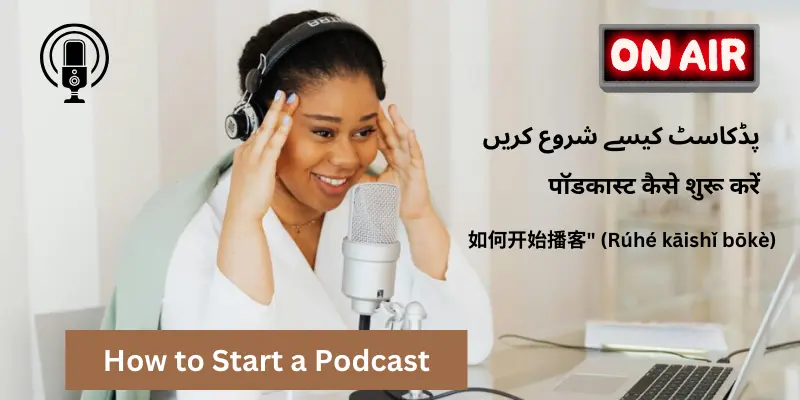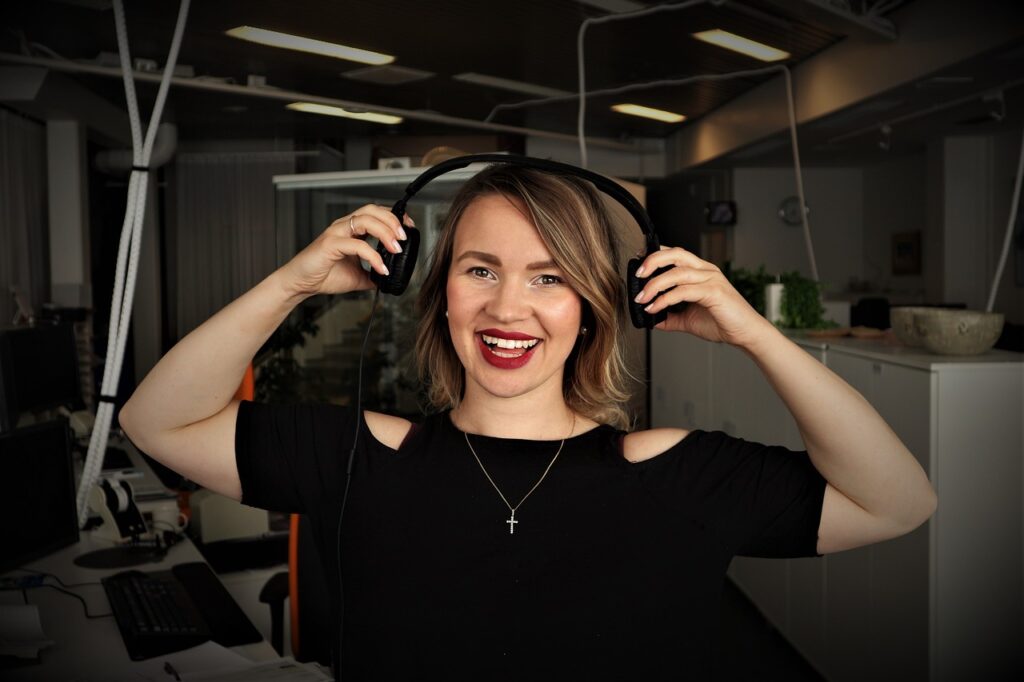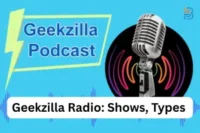How to Start a Podcast in 2025: Tips & Step-by-Step Guide
Published: 11 Sep 2024
Have you ever wanted to start a podcast but didn’t know where to begin? You’re not alone. With over 500 million podcast listeners worldwide (Statista, 2025), the demand for fresh voices is higher than ever. Whether you want to build a brand, share your expertise, or just have fun, podcasting is one of the most rewarding ways to connect with an audience.

Why Start a Podcast?
Podcasting has become one of the fastest-growing forms of media. Here’s why so many people are starting their own shows:
- 🎙 Creative outlet – Share stories, ideas, or passions.
- 🌍 Global reach – Connect with listeners worldwide.
- 💼 Authority building – Position yourself as an expert.
- 💰 Monetization opportunities – Ads, sponsorships, or subscriptions.
- 🤝 Community – Build loyal relationships with your audience.
Define Your Podcast Idea
Your idea is the foundation of your show. Without a clear direction, it’s easy to lose focus.
Tips for defining your niche:
🎯 Choose a topic you’re passionate about.
👥 Think about your target audience.
🧩 Narrow your niche (e.g., “personal finance for millennials” instead of just “finance”).
📚 Research competitors to find gaps you can fill. types of interview podcast
Choose a Podcast Format
There’s no one-size-fits-all. Pick a format that works best for your style:
- 🎤 Solo podcasts – One host sharing insights.
- 👥 Interview podcasts – Guests bring fresh perspectives.
- 🎭 Storytelling/narrative – Great for fiction or documentaries.
- 🎙 Panel shows – Multiple hosts discuss a topic. podcast play in order
Get the Right Equipment
You don’t need a studio, but clear audio is non-negotiable.
Basic setup for beginners:
- 🎙 Microphone – USB mics like Blue Yeti or ATR2100x.
- 🎧 Headphones – Closed-back headphones for editing.
- 💻 Recording software – Audacity (free) or Adobe Audition.
- 🔊 Pop filter – Reduces unwanted noise.
Plan and Record Your First Episode
Preparation makes recording smoother.
- 📝 Write a simple script or outline.
- 📍 Choose a quiet space.
- 🎬 Record an engaging intro (who you are + what the show is about).
- 🎙 Speak naturally—mistakes can be e
Edit for Professional Quality
Editing polishes your audio and makes it more enjoyable for listeners. A clean, consistent sound keeps your audience engaged and encourages them to return for future episodes.
✂️ Remove background noise and mistakes
🎶 Add intro/outro music for branding
🎚 Normalize volume for consistency
💾 Save files in MP3 format (128–192 kbps).
Choose a Hosting Platform
A hosting platform is the backbone of your podcast. It stores your episodes and distributes them across directories, ensuring your content reaches listeners everywhere.
Popular options:
🔹 Buzzsprout – User-friendly with analytics
🔹 Anchor (Spotify for Podcasters) – Free and simple
🔹 Podbean – Affordable with unlimited hosting
Key features to look for:
- RSS feed generation
- Storage space
- Analytics dashboard
- Pricing flexibility
Submit to Directories
Submitting your podcast to directories is essential for visibility. The more platforms you appear on, the more chances people have to discover your content.
- Apple Podcasts
- Spotify
- Google Podcasts
- Amazon Music
- Stitcher
Launch With a Strategy
Launching your podcast the right way sets the tone for long-term success. Don’t release just one episode—give listeners multiple options to binge.
Best practices for launching:
- 🎬 Release 3–5 episodes at launch
- 📣 Promote on social media and email lists
- 💬 Ask friends/followers for reviews
Promote and Grow Your Podcast
Podcast growth requires consistent marketing and audience interaction. Relying on organic discovery isn’t enough—you need to actively promote your show.
Promotion strategies:
- 📱 Share snippets on Instagram, TikTok, and LinkedIn
- 🎙 Appear as a guest on other podcasts
- 📰 Optimize episode titles and descriptions for SEO
- 🤝 Invite guests with their own following
- 👉 Cross-promotion and steady marketing help build a loyal listener base.
Monetize Your Podcast
Once you have an audience, you can turn your podcast into income. Monetization works best when it adds value without overwhelming your listeners.
Ways to monetize:
- 💰 Sponsorships and ads
- 🎟 Premium content or memberships (Patreon)
- 📦 Branded merchandise
- 🔗 Affiliate marketing .
Common Mistakes to Avoid
Even strong podcasts fail due to simple but costly mistakes. Avoiding these will keep your audience engaged.
❌ Poor audio quality
❌ Inconsistent release schedule
❌ Overly long, unstructured episodes
❌ Ignoring SEO in titles and descriptions
❌ Not engaging with listeners
👉 Correcting these mistakes helps you grow faster and retain loyal fans.
Pros and Cons of Podcasting
Podcasting offers unique opportunities, but it also comes with challenges. Knowing both helps you set realistic expectations.
Pros:
✅ Creative freedom
✅ Potential income streams
✅ Build authority and community
✅ Low barrier to entry
Cons:
❌ Time-consuming editing
❌ Intense competition
❌ Requires consistency to grow
👉 Weighing the pros and cons helps you stay prepared on your podcasting journey.
- best AI podcast
- best info podcast
- best interview podcast
- business-podcast-guide
- Creator Podcasts
- Top Apple Podcasts
Podcast Analytics: Tracking Your Success
Analytics are key to understanding your audience and improving your content. They help you make data-driven decisions that grow your show.
📊 Track downloads and listens
🧑🤝🧑 Analyze listener demographics
⏱ Monitor retention rates
🔁 Refine content based on data
👉 Analytics help you learn, adapt, and continuously grow your podcast.
FAQs About Starting a Podcast
Q1: How much does it cost to start a podcast?
It can be free with basic tools, but expect to spend $50–$200 on equipment and hosting.
Q2: Do I need a studio to start?
No. Many podcasters record at home with budget-friendly setups.
Q3: How long should episodes be?
Most fall between 20–60 minutes. Focus on providing value.
Q4: Can I start a podcast alone?
Yes. Solo podcasts are popular, flexible, and easier to manage.
Q5: How do I grow my podcast audience?
Promote consistently, optimize SEO, and engage with your listeners.
| solutions for podcast |
|---|
Here are effective solutions to improve and grow a podcast:
|
“Every voice has a story, and every story deserves to be heard. Tune in, because your next inspiration might be just one episode away.Mohammad
- Engaging content: It covers interesting, relevant topics that resonate with the target audience.
- High production quality: Clear audio, well-edited segments, and smooth transitions are important.
- Consistency: Regularly released episodes with a consistent format and tone build audience loyalty.
- Expertise and authenticity: Hosts who are knowledgeable, passionate, and genuine attract listeners.
- Audience connection: Good podcasts engage listeners, encouraging feedback, questions, and interaction.
Do you listen to any podcasts regularly or are you looking for recommendations?
- Poor audio quality: Background noise, unclear voices, or inconsistent volume levels can turn off listeners.
- Unfocused content: Rambling conversations or lack of structure make it hard to follow and engage with.
- Irregular updates: Inconsistent release schedules make it difficult for listeners to stay connected.
- Lack of preparation: Unprepared hosts or guests can result in awkward pauses, inaccurate information, or boring discussions.
- Overly long or dull: Podcasts that drag on without offering value can lose the audience’s attention quickly.
Do any of these qualities stand out from podcasts you’ve encountered?
Conclusion
Starting a podcast requires thoughtful planning, the right equipment, and a good recording environment. By following these steps, you’ll set yourself up for success and create a podcast that resonates with your audience. Keep refining your process as you grow, and most importantly, enjoy the journey of podcasting! how to start a podcast best tips and solutions

Proudly powered by WordPress

- Be Respectful
- Stay Relevant
- Stay Positive
- True Feedback
- Encourage Discussion
- Avoid Spamming
- No Fake News
- Don't Copy-Paste
- No Personal Attacks

- Be Respectful
- Stay Relevant
- Stay Positive
- True Feedback
- Encourage Discussion
- Avoid Spamming
- No Fake News
- Don't Copy-Paste
- No Personal Attacks






